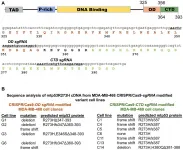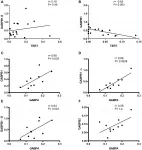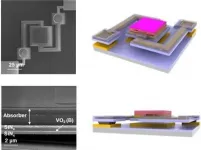DALLAS, July 26, 2021 -- People who are just beginning treatment for high blood pressure can benefit equally from two different classes of medicine - angiotensin-converting enzyme (ACE) inhibitors and angiotensin receptor blockers (ARBs) - yet ARBs may be less likely to cause medication side effects, according to an analysis of real-world data published today in Hypertension, an American Heart Association journal.
While the class of blood pressure-lowering medicines called angiotensin-converting enzyme (ACE) inhibitors may be prescribed more commonly, angiotensin receptor blockers (ARBs) work just as well and may cause fewer side effects. Currently, ACE inhibitors are prescribed more commonly than ARBs as a first-time blood pressure control medicine.
The findings are based on an analysis of eight electronic health record and insurance claim databases in the United States, Germany and South Korea that include almost 3 million patients taking a high blood pressure medication for the first time with no history of heart disease or stroke.
Both types of medicines work on the renin-angiotensin-aldosterone system, a group of related hormones that act together to regulate blood pressure. ACE inhibitors lower blood pressure by blocking an enzyme early in the system so that less angiotensin, a chemical that narrows blood vessels, is produced, and blood vessels can remain wider and more relaxed. ARBs block receptors in the blood vessels that angiotensin attaches to, diminishing its vessel-constricting effect.
"In professional guidelines, several classes of medications are equally recommended as first-line therapies. With so many medicines to choose from, we felt we could help provide some clarity and guidance to patients and health care professionals," said RuiJun Chen, M.D., M.A., lead author of the study, assistant professor in translational data science and informatics at Geisinger Medical Center in Danville, Pennsylvania, and NLM postdoctoral fellow at Columbia University at the time of the study.
The AHA/ACC 2017 Guideline for the Prevention, Detection, Evaluation and Management of High Blood Pressure in Adults says the primary medications for treating high blood pressure are thiazide diuretics, ACE inhibitors, ARBs, and calcium channel blockers as they have been shown to reduce cardiovascular events. Physical activity and other lifestyle changes are recommended for managing all levels of high blood pressure, even if medication is required.
Health records for patients who began first-time blood pressure-lowering treatment with a single medicine between 1996-2018 were reviewed for this study. Researchers compared the occurrence of heart-related events and stroke among 2,297,881 patients treated with ACE inhibitors to those of 673,938 patients treated with ARBs. Heart-related events include heart attack, heart failure or stroke, or a combination of any of these events or sudden cardiac death recorded in the database. The researchers also compared the occurrence of 51 different side effects between the two groups. Follow-up times varied in the database records, but they ranged from about 4 months to more than 18 months.
They found no significant differences in the occurrence of heart attack, stroke, hospitalization for heart failure, or any cardiac event. However, they found significant differences in the occurrence of four medication side effects. Compared with those taking ARBs, people taking ACE inhibitors were:
3.3 times more likely to develop fluid accumulation and swelling of the deeper layers of the skin and mucous membranes (angioedema); 32% more likely to develop a cough (which may be dry, persistent, and bothersome); 32% more likely to develop sudden inflammation of the pancreas (pancreatitis); and 18% more likely to develop bleeding in the gastrointestinal tract; "We did not detect a difference in how the two types of medicine reduced the complications of hypertension, but we did see a difference in side effects," said George Hripcsak, M.D., senior author of the study and professor and chair of biomedical informatics at Columbia University Vagelos College of Physicians and Surgeons and medical informatics services director at New York-Presbyterian/Columbia University Irving Medical Center. "If a patient is starting hypertension therapy for the first time, our results point to starting with the ARB over the ACE inhibitor."
"ARBs do not differ in effectiveness and may have fewer side effects than ACE inhibitors among those just beginning treatment," said Chen. "We unfortunately cannot extend these conclusions to people who are already taking ACE inhibitors or those who are taking multiple medications. We would reiterate that if you experience any side effects from your medicine, you should discuss with your doctor whether your antihypertensive regimen may need to be adjusted."
The study is limited by wide variation in the length of time patients were included in the different databases. Although many people were followed for a long period of time, those who had shorter follow-up periods may not have taken the medications long enough to experience their full benefits in preventing cardiovascular disease events. Most of the participants taking ACE inhibitors (80%) were taking lisinopril, and the most used ARB (45% of those taking this class of medication) was losartan, so the results may not be fully generalizable to other medicines in these classes. It is also important to note that results from this analysis of first-line therapy may not be generalizable to people with hypertension who have been prescribed combination treatment or who switch from one type of medication to another.
"In addition to encouraging patients to live a healthy lifestyle and taking medication as prescribed to control blood pressure, the American Heart Association recommends regular self-blood pressure monitoring with a validated device and working with a health care professional on a plan to reduce blood pressure," said Willie Lawrence, M.D., interventional cardiologist and medical director for Health Equity, Spectrum Health, Benton Harbor, Michigan and head of the American Heart Association's National Hypertension Control Initiative Oversight Committee.
INFORMATION:
Co-authors are Marc A. Suchard, M.D., Ph.D.; Harlan M. Krumholz, M.D., S.M.; Martijn J. Schuemie, Ph.D.; Steven Shea, M.D.; Jon Duke, M.D.; Nicole Pratt, Ph.D.; Christian G. Reich, M.D., Ph.D.; David Madigan, Ph.D.; Seng Chan You, M.D.; and Patrick B. Ryan, Ph.D. Disclosures are in the manuscript.
The study was supported by the National Library of Medicine and the National Institute of Allergy and Infectious Diseases of the National Institutes of Health; the National Science Foundation; and the Ministries of Health & Welfare and of Trade, Industry & Energy of the Republic of Korea.
Additional Resources:
Available multimedia is on right column of release link: https://newsroom.heart.org/news/two-types-of-blood-pressure-meds-prevent-heart-events-equally-but-side-effects-differ?preview=323a626ae56acb0c2de97b73a1eb2b38
Statements and conclusions of studies published in the American Heart Association's scientific journals are solely those of the study authors and do not necessarily reflect the Association's policy or position. The Association makes no representation or guarantee as to their accuracy or reliability. The Association receives funding primarily from individuals; foundations and corporations (including pharmaceutical, device manufacturers and other companies) also make donations and fund specific Association programs and events. The Association has strict policies to prevent these relationships from influencing the science content. Revenues from pharmaceutical and biotech companies, device manufacturers and health insurance providers are available here, and the Association's overall financial information is available here.
About the American Heart Association
The American Heart Association is a relentless force for a world of longer, healthier lives. We are dedicated to ensuring equitable health in all communities. Through collaboration with numerous organizations, and powered by millions of volunteers, we fund innovative research, advocate for the public's health and share lifesaving resources. The Dallas-based organization has been a leading source of health information for nearly a century. Connect with us on heart.org, Facebook, Twitter or by calling 1-800-AHA-USA1.




